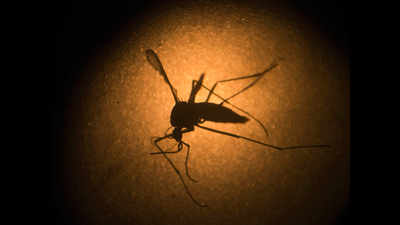- News
- City News
- Hyderabad News
- Monsoon mania: Fever Hospital records 15 malaria cases in 3 days
Trending
This story is from July 25, 2018
Monsoon mania: Fever Hospital records 15 malaria cases in 3 days

Representative image
HYDERABAD: With the monsoon season setting, the state-run Fever Hospital has seen a sudden spike in count of malaria patients, with at least 15 positive cases reported in the last three days alone. This apart, doctors say, the incidence of suspected cases too has shot up significantly in the recent past. From 5-10 cases being recorded in a week, the figure has now touched 50-100 per day, doctors added.
While authorities are yet to ascertain the exact reason for this sudden surge in malaria cases, they suspect it is due to large-scale breeding of mosquitoes.“The jump in number of cases could be monsoon-related and the rise in mosquito menace during this season. Also some of the patients have reported having recently been on pilgrimage. So that could be another reason,” said Dr K Shankar, superintendent, Fever Hospital, adding, “Most of the cases being reported are from in and around Hyderabad.”

The rest of the state too are seen reporting several cases with the records of the National Vector Borne Disease Control Programme, (for July 23 alone) pegging the total count of positive patients at 25. Of them, 19 were recorded in Kothagudem, five in Medak and one in Adilabad.
Given the current situation, experts suggest that patients running fever do not neglect their health as the incidence of malaria, dengue and even chikungunya peaks during this time of the year. “Cold, cough and fever is very common now; but fever should not be neglected, particularly if they are prolonged (for more than two days),” said Dr Papa Rao Nadakuduru, consultant physician at a city hospital.
Apart from fever at regular intervals, bouts of shivering, muscle pain and weakness are the other symptoms of malaria, doctors added.
In fact, in most instances, malaria cases are reported in clusters (many people from the same area test positive) due to the concentration of malaria spreading-female Anopheles mosquitoes in one pocket. The count of such cases is high in areas that have poor sanitation systems and are faced with the issue of water stagnation. “These civic loopholes allow mosquitoes to breed and multiply,” said a health expert, advising people to take appropriate precautions - maintain hygienic conditions in and around their homes and use mosquito repellents — to protect themselves from the disease.
While authorities are yet to ascertain the exact reason for this sudden surge in malaria cases, they suspect it is due to large-scale breeding of mosquitoes.“The jump in number of cases could be monsoon-related and the rise in mosquito menace during this season. Also some of the patients have reported having recently been on pilgrimage. So that could be another reason,” said Dr K Shankar, superintendent, Fever Hospital, adding, “Most of the cases being reported are from in and around Hyderabad.”

The rest of the state too are seen reporting several cases with the records of the National Vector Borne Disease Control Programme, (for July 23 alone) pegging the total count of positive patients at 25. Of them, 19 were recorded in Kothagudem, five in Medak and one in Adilabad.
“This number is only likely to increase further over the next few weeks and the monsoon season gathers steam,” said an health official.
Given the current situation, experts suggest that patients running fever do not neglect their health as the incidence of malaria, dengue and even chikungunya peaks during this time of the year. “Cold, cough and fever is very common now; but fever should not be neglected, particularly if they are prolonged (for more than two days),” said Dr Papa Rao Nadakuduru, consultant physician at a city hospital.
Apart from fever at regular intervals, bouts of shivering, muscle pain and weakness are the other symptoms of malaria, doctors added.
In fact, in most instances, malaria cases are reported in clusters (many people from the same area test positive) due to the concentration of malaria spreading-female Anopheles mosquitoes in one pocket. The count of such cases is high in areas that have poor sanitation systems and are faced with the issue of water stagnation. “These civic loopholes allow mosquitoes to breed and multiply,” said a health expert, advising people to take appropriate precautions - maintain hygienic conditions in and around their homes and use mosquito repellents — to protect themselves from the disease.
End of Article
FOLLOW US ON SOCIAL MEDIA










